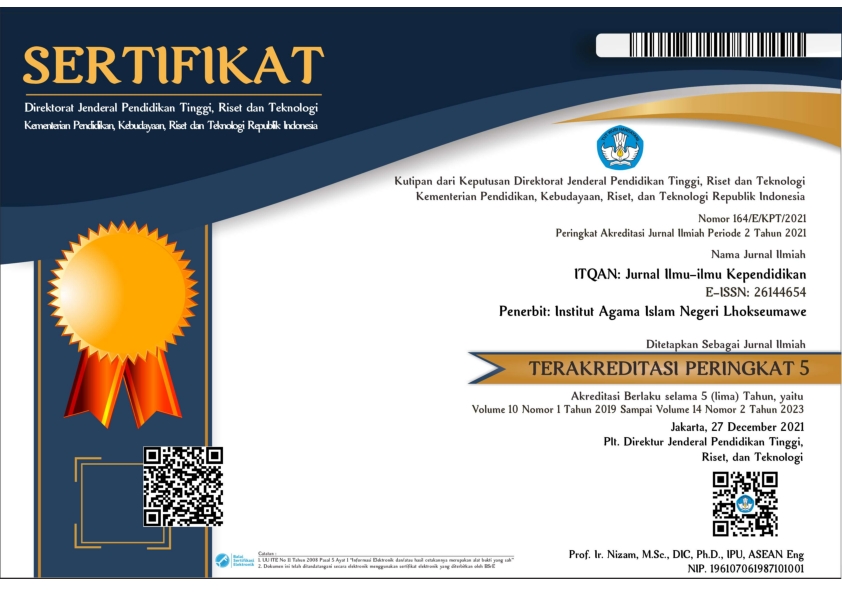Efektivitas Pendekatan Rational Emotive Behavior Therapy Setting Kelompok untuk Meningkatkan Kontrol Diri Siswa dalam Pencegahan Penyalahgunaan Narkoba
Main Article Content
Rahmat Hidayat
Yeni Karneli
Drug abuse is a negative/irrational behavior that can harm oneself and others. One of the causes of drug abuse is the low self-control of students. Clients who have problems with low self-control in drug abuse need to be counseled through rational emotive behavior therapy in group settings. The aims of this study were: (1) to test the significant difference in the level of self-control of the experimental group students before and after being given the rational emotive behavior therapy setting technique, (2) to test the significant difference in the level of self-control of the control group students before and after being given services without treatment specifically, (3) examine the effectiveness of the rational approach to emotive behavior therapy setting in groups in increasing self-control in preventing drug abuse. This study used a quasi-experimental non-equivalent control group design with pretest and posttest. The research subjects were students of class VIII-3 and VIII-4 at SMP Negeri 4 Padang Pariaman with a sample of 20 people who were divided into 2 groups consisting of 10 people as the experimental group and 10 people as the control group. The sampling technique was purposive sampling technique. Data were analyzed using the Wilcoxon signed Rank Test and Kolmogorov Smirnov 2 Independent Samples with the help of SPSS version 20. The results showed that the rational emotive behavior threapy approach was effective in increasing students' self-control in preventing drug abuse. This can be seen from: (1) there is a significant difference in the level of self-control of the experimental group students before and after being given the rational emotive behavior therapy setting technique, (2) there is a significant difference in the level of self-control of the control group students before and after being given services without treatment specifically, (3) there is the effectiveness of the rational approach to emotive behavior therapy setting in groups in increasing self-control in preventing drug abuse. The implementation of the rational emotive behavior therapy setting approach in groups should be intensified in the form of Guidance Counseling programs and designed as well as possible by counsellors or Guidance Counseling teachers.
Amanda, M. P., Humaedi, S., & Santoso, M. B. (2017). Penyalahgunaan Narkoba di Kalangan Remaja (Adolescent Substance Abuse). Prosiding Penelitian dan Pengabdian kepada Masyarakat, 4(2). https://doi.org/10.24198/jppm.v4i2.14392.
Ariningsun, A. (2014). Penerapan Konseling Kelompok Rasional Emotif Perilaku untuk Meningkatkan Pengendalian Diri Siswa Kelas VIII SMP Negeri 4 Panggul Trenggalek. State University of Surabaya. https://core.ac.uk/works/68516829.
Bahri, S. (2019). Pelayanan Bimbingan dan Konseling dalam Membina Akhlak Siswa SMP Negeri Se-Kota Lhokseumawe. ITQAN: Jurnal Ilmu-Ilmu Kependidikan, 10(1), 13–20. https://doi.org/10.47766/itqan.v10i1.228.
Budiharto, S. (2005). Kecenderungan Ketergantungan Penyalahgunaan Napza pada Remaja Ditinjau dari Keteraturan Menjalankan Shalat Wajib dan Kontrol Diri. https://dspace.uii.ac.id/handle/123456789/25142.
Budiman, C. (1999). Menjadi Orang Tua Idaman: Rubrik Konsultasi Psikologi KOMPAS. Kompas.
Darwis, A., Dalimunthe, G. I., & Riadi, S. (2017). Narkoba, Bahaya dan Cara Mengantisipasinya. Amaliah: Jurnal Pengabdian kepada Masyarakat, 1(1), 36–45. https://doi.org/10.32696/ajpkm.v1i1.14.
Ellis, A., & Dryden, W. (2007). The Practice of Rational Emotive Behavior Therapy. Springer Publishing Company.
Fadly, R. T. (2016). Pengaruh Kontrol Diri terhadap Perilaku Merokok pada Pengurus Pondok Pesantren Al-Amien Prenduan Sumenep-Madura. Universitas Islam Negeri Maulana Malik Ibrahim. http://etheses.uin-malang.ac.id/id/eprint/3098.
Gottfredson, M. R., & Hirschi, T. (2022). A general theory of crime. In A General Theory of Crime. Stanford University Press.
Hakim, L. (2015). Pengaruh Terapi Religi Shalat dan Dzikir terhadap Kontrol Diri Klien Penyalahgunaan Narkotika. Universitas Islam Negeri Maulana Malik Ibrahim. http://etheses.uin-malang.ac.id/id/eprint/3131.
Herlina, Y. (2017). Penerapan Rational Emotive Behavior Therapy terhadap Kontrol Diri dalam Mengurangi Penyalahgunaan Narkotika, Psikotropika, dan Zat Adiktif di Bandung. Pekerjaan Sosial, 16(1).
Miya, K. (2021). Konsesling Iindividual untuk Meningkatkan Kontrol Diri Pecandu Narkoba di Rumah Rehabilitasi House of Serenity Bandar Lampung. UIN Raden Intan Lampung. http://repository.radenintan.ac.id/id/eprint/13193.
Nisa, F. K. (2020). Efektivitas Layanan Bimbingan Kelompok dengan Menggunakan Pendekatan Rational Emotive Behaviour Therapy (Rebt) untuk Meningkatkan Kontrol Diri Siswa Kelas VII SMP Muhammdiyah 49 Medan Tahun Ajaran 2019/2020. http://repository.umsu.ac.id/handle/123456789/4807.
Saefulloh, A., & Syarif, M. (2019). Model Pendidikan Islam bagi Pecandu Narkotika (Vol. 1). Deepublish (CV. Budi Utama).
Setiawan, I., & Mugiarso, H. (2021). Konseling Kelompok Berbasis Cybercounseling Pendekatan Rational Emotive Behaviour Theraphy (REBT) untuk Meningkatkan Kontrol Diri Siswa. ENLIGHTEN: Jurnal Bimbingan Konseling Islam, 4(1), 30–41. https://doi.org/10.32505/enlighten.v4i1.2635.
Sood, M., Puttrawandi, L., & Rizki, K. (2021). Upaya Pencegahan Peredaran Narkoba dalam Rangka Melindungi Masyarakat di Kabupaten Lombok Tengah Nusa Tenggara Barat. Jurnal Warta Desa (JWD), 3(2), 91–96. http://jwd.unram.ac.id/index.php/jwd/article/view/129.
Tarigan, I. J. (2017). Peran Badan Narkotika Nasional dengan Organisasi Sosial Kemasyarakatan dalam Penanganan Pelaku Penyalahgunaan Narkotika. Deepublish.



